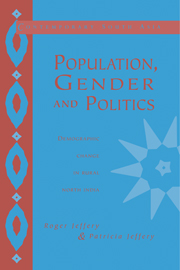Book contents
5 - Modern mindsets or empowered women?
Published online by Cambridge University Press: 07 January 2010
Summary
The idea that ‘modern’ people can not only ensure that their children live to maturity, but can also act ‘rationally’ to limit the number of children they have, is at the source of the modern discipline of demography in the disputes between Malthus and Condorcet at the end of the eighteenth century. Whereas Malthus was sceptical of the possible role of ‘moral restraint’, Condorcet believed that the abolition of prejudice and superstition, encouraged by the spread of education (particularly of women) would lead people to choose small families voluntarily (Sen 1995). Thus the idea that economic and social changes – urbanization and industrialization in particular – would bring new ways of thinking and understanding in their wake has a long pedigree. It was taken up most thoroughly in the 1960s, when the sociology of social and economic change was heavily influenced by the work of Talcott Parsons and Wilbert Moore. One of the most extended pieces of research in this perspective was organized at Harvard, and involved questionnaires administered to men (but not women) in countries in Africa, Latin America and Asia (including Pakistan). It was published under the title Becoming Modern (Inkeles and Smith 1974). Within sociology, work in this genre has been heavily criticized for its valueladen evolutionary schema in which contemporary US small-town society was treated as the archetype of the ‘modern’. Writers using this approach have failed to take seriously differences in historical, cultural and economic context, have often used teleological arguments, and have made naive and often ethnocentric assumptions about the inevitability of ‘progress’.
- Type
- Chapter
- Information
- Population, Gender and PoliticsDemographic Change in Rural North India, pp. 165 - 211Publisher: Cambridge University PressPrint publication year: 1997



